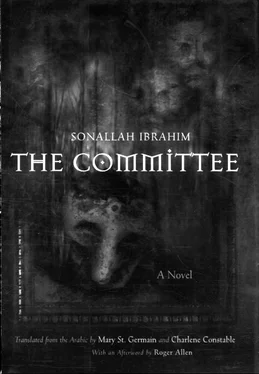However, all agreed that the Committee sets clever traps for everyone it interviews. This means that the tale of the door that wouldn't shut was not a coincidence. It revealed my confusion and lack of resourcefulness even before the interview began.
You can imagine my state after failing this test. I stood before them drenched in sweat. Oddly enough, I sensed, way down deep, a feeling of satisfaction at this failure, as though some part of me feared success. This did not prevent my confusion or my overwhelming desire to gain the approval of those lined up before me at the long table stretching the width of the hall.
There were many of them. Unable to concentrate, I couldn't count accurately. Some of them were absorbed in whispered asides, and others in leafing through the papers before them. Most wore large dark glasses to hide their eyes. It seemed to me that among them were familiar faces, which had looked out at me at one time or another from the pages of newspapers and magazines. I also discovered that I knew the owner of the tactful voice: an old maid whom I had met on some occasion. I reproached myself that I had not shown any interest in her at that time. She looked at me with what I thought was a friendly smile.
It didn't surprise me to see the military represented among them. On their collars, red ribbons edged with gold indicated their high rank.
In the middle of the group was a decrepit old man who wore thick eyeglasses and held a paper so close it almost touched them. He was trying hard to read. I surmised that the paper must be part of a special dossier on me.
The old man finished reading, or perhaps gave up trying, and put the paper down on the table. As he turned his head to the left, then the right, his colleagues realized that the session had convened. They fell silent and turned their eyes on me.
I stared at the old man's lips. His sallow face seemed as remote from life as it could be.
He spoke to me, "At the beginning of this meeting, I would like to put on record my appreciation, which my companions share, of your choosing to appear before us. This does not mean that we will necessarily endorse your point of view. This matter depends on many things, and we are here today to settle it. But what I would like to make clear is that an appearance before the Committee, as everyone knows, is not compulsory. In this day and age, everyone enjoys complete freedom of choice. This choice on your part reflects a high degree of sound judgment and perspicacity. This is an important indicator, which we will take into consideration when we review your case. Only first, we would like to hear your point of view in this matter."
I was aware of what I had heard from various sources: the Committee always requires those it interviews to present the reasons and motives bringing them before it. Therefore, I had prepared an answer in advance.
I had expected the Committee to be on to me, so I thought long and hard before settling on the requisite response. I did not want to present a trite answer, something they had heard before, ostensibly meant to flatter. Rather, I wanted to present a unique answer that would appear simple and spontaneous, as though the question had taken me by surprise. My reply would be reliable and true, giving a precise picture of myself without getting entangled in specifics, such as the true motives of some of my actions. I must allude to these activities so as to absolve myself of responsibility for everything prejudicial to me in the case. I must make them infer what I imagined would meet with their approval.
In fact, this was an extremely onerous task, given the highly sophisticated surveillance techniques which they use to find out everything about me.
Working up my nerve, I took several deep breaths, then began to speak. My voice could scarcely be heard. The old man leaned forward, cupping his hand around his right ear, "Excuse me. I don't hear well with this ear. Can you speak up?"
I complied with his request and began the answer I had already prepared. Needless to say, I forgot a large part of it, as I nervously struggled to speak their language without serious grammatical mistakes.
Nevertheless, I managed to sketch a general picture of my background, and the way my life evolved under circumstances which allowed me few options. At the same time, I was spurred on by grandiose dreams and the desire to promote my talents and get everything I could out of them. I made sure I mentioned the standards and moral principles by which I was guided.
After that, I moved on to the misfortune that had caused my illness. I said that, in all likelihood, my illness was the result of a vast disparity between ambitions and actual abilities, leaving me fed up with everything, to the point where I had no option but to change my life completely.
I added a well-rehearsed dramatic flourish to my speech: opening my briefcase, I took out a sheaf of testimonials which I had obtained from various sources, extolling my abilities and confirming the accuracy of the information I had presented.
Since most of these documents were in Arabic, I began to speak about them in the Committee's language. They listened to me with interest, while sorting through the papers I had just given them. I noticed that a fair-complected and light-eyed member seated at the old man's left paid no attention to the testimonials. He was absorbed in examining a file that undoubtedly contained secret reports on me.
A short, ugly member seated on the chairman's right, between him and an officer, looked up and addressed me with hostility, "I can't understand you. After all the progress you've made, here you are trying to start over. Don't you think it's a little late for this?"
I answered him brightly, "Indeed, most people start a new life at forty. This isn't a new beginning in the strict sense of the word, but rather the culmination of the earlier stages of life's journey, a complete blossoming of the diverse potentials I possess. From any angle, it can be considered a natural evolution of my personality."
Stubby snorted angrily. I was taken aback by his rancor. I had a vague feeling that I might have antagonized him by demonstrating my talents and even going so far as to offer proof in the form of those testimonials from respected and influential parties.
I continued this train of thought and came to the conclusion that perhaps as a young man he had stood in my shoes. The Committee must have given him its stamp of approval, but apparently he had failed to live up to expectations. It would seem that in the end he got no further than being merely one of its members. Notwithstanding the Committee's importance and its extensive influence, some, including me, consider membership in it evidence of withering talent and complete failure.
One of the ladies, elderly and dignified, spoke. She was seated at the far left, near an obese man wearing a white jacket, his legs crossed, his head thrown back, gazing at the ceiling as though he were not with us. She asked me, "Do you know how to dance?"
"Yes, indeed. Of course."
Stubby butted in, "Show us, then."
"What sort of dancing?"
I realized this question was a mistake. What sort of dancing, indeed! As if there were any other.
Without hesitation I acted, hoping speed and finesse would testify on my behalf. Finding nothing else, I took my necktie and wound it around my waist just above my hipbones, right where it would emphasize the body's flexibility. I made a point of putting the knot on the side, as professional belly dancers do. I soon discovered that worn this way, it had a great feature: it separates the belly from the backside, allowing each independent movement.
I began to undulate, lifting my ankles a little off the ground. Glancing down at them over my shoulder, I raised my arms above my head and twined my fingers, framing my face with my arms. I danced energetically for a little while, making an effort to snap my fingers, even after linking my index fingers. I was so absorbed I didn't notice the impression I made on the members.
Читать дальше











